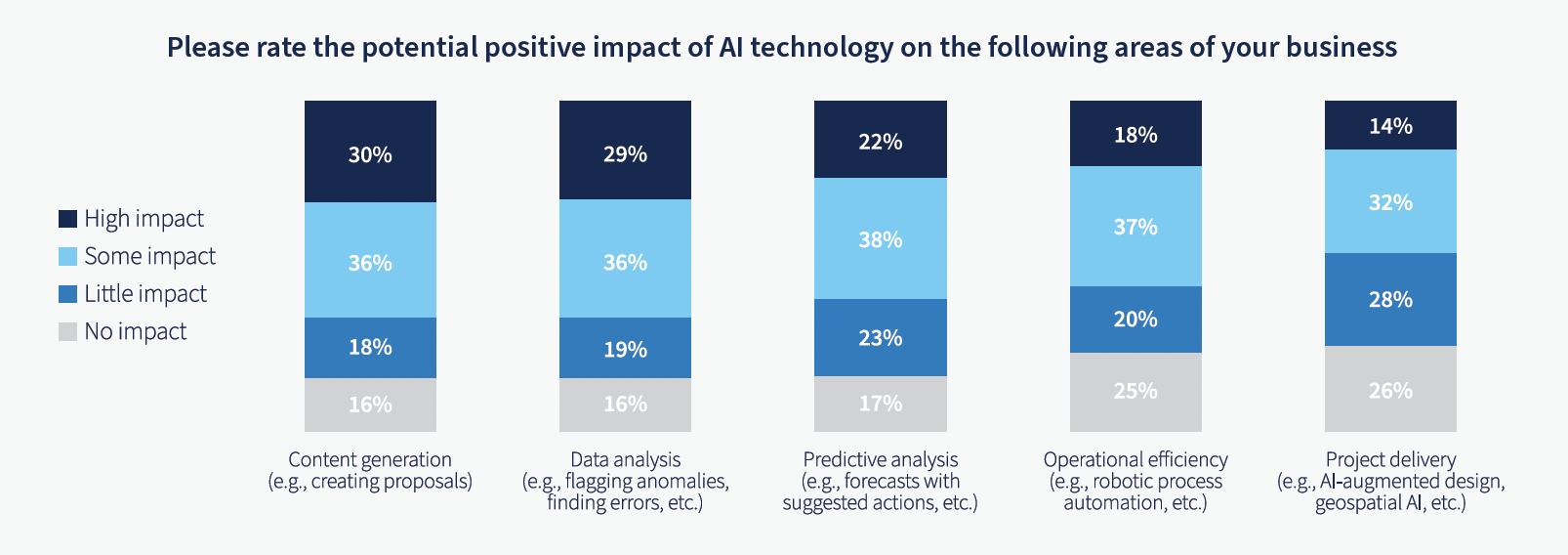For Government Contracting Companies, AI Can Be a Gift That Keeps on Giving


For Government Contracting Companies, AI Can Be a Gift That Keeps on Giving
Report highlights how AI can benefit a GovCon business, offers best practices for a successful AI journey
By Kim Koster
Government contractors make their living working for, and being held accountable to, the U.S. government and by extension, the American public. That means they have to deal with a uniquely challenging set of risks. And that likely explains why they’re approaching artificial intelligence more cautiously than other industries.
In the 2024 GAUGE Report, a comprehensive annual benchmarking analysis for the government contracting (GovCon) industry (available for free download here), we found a cautious uptake of AI among the 1,200 contributors. In the report (which I co-authored with CohnReznick’s Christine Williamson), about one-third of contributors indicated their companies are currently using AI in its various forms. That’s a significantly lower adoption rate than we’ve seen with other industries. In a separate 2024 Unanet benchmarking report covering the architecture, engineering and construction industries, more than half the companies we surveyed indicated they currently use AI.
As much as taking a conservative approach to AI makes sense in light of the security, ethical, compliance and other risks it presents, there’s another AI-related risk that GovCon companies must account for: the risk of being too cautious in integrating it into their business. Not only do overly conservative companies stand to miss out on the significant value the technology can create inside their business, that reticence could ultimately put them at a decided competitive disadvantage.
It’s a fine line to walk, but one they must walk nonetheless because, as we wrote in the 2024 GAUGE Report, “From enhancing strategic forecasting and planning, automating tedious administrative tasks, detecting operational issues and analyzing data trends, AI offers many powerful capabilities that growth-minded GovCon businesses can no longer afford to ignore.”
Business development is one area where AI can really move the needle for government contractors. In the 2024 GAUGE Report (see the two graphics below), more than half the executives we surveyed indicated their companies either currently use or plan to use AI in business development/marketing. They identified content generation as an area within business development where AI can have a significant impact.
Amid fierce competition for government contracts, 57% of GAUGE contributors said finding new revenue sources is their company’s most significant financial challenge. Meanwhile, roughly 60% of GovCons indicated they’re winning less than 50% of the proposals they submit, and close to two-thirds saw no improvement in win rate year-over-year.
AI can help change all that. With AI-driven analytics to evaluate and prioritize new business opportunities, companies can comb the digital landscape to uncover new business opportunities, then target projects and clients that align with their strategic priorities. AI algorithms also can predict the probability of success for projects, helping decision-makers prioritize their new business pursuits.
Meanwhile, AI-powered content-generation tools can help firms improve and refine the proposals they submit, which translates into more winning bids. For example, AI can assist a proposal team in interpreting complex contract language and developing optimal pricing strategies for a bid. It also can automate content-collection so companies can generate proposals faster, with greater accuracy, boosting proposal-generation capacity and overall proposal quality without increasing headcount.
Project management is another area where AI is proving its versatility and value. Predictive analytics can help companies anticipate labor shortages, identify skills deficits, and make assignments across projects and tasks, optimizing utilization. AI also can examine past trends and project data to help companies bring more fidelity into the budget. It enables a company to create more reliable estimates for on-time delivery at the anticipated cost. These insights enable project managers to quickly course-correct when needed, which can translate into better project outcomes, stronger client relationships and more repeat business. With natural language processing, project managers can get key information from emails, contracts, and reports delivered to them in seconds, supporting timelier, better-informed decision-making.
While relatively few GovCon companies are using AI in their finance & accounting operations, our GAUGE findings suggest there are benefits to doing so. For example, companies that use AI are much less likely to have invoice cycles longer than 15 days relative to companies that don’t use AI. That’s particularly important for smaller companies, which depend more on consistent cash flow. What’s more, intelligent AR (accounts receivable) and AP (accounts payable) automation tools show great promise for taking manual work off peoples’ plates, and helping companies get paid more efficiently, securely, and accurately.
AI can be a difference-maker in another critical area for government contracting companies: compliance. Close to 40% of companies are either considering how to use AI or are already using AI to support greater efficiency in meeting the growing regulatory responsibilities they face. AI models can be trained to interpret regulatory language, and to detect and alert companies to data disparities across systems and reports.
Use cases such as these barely scratch the surface of what AI can do for a government contracting business. But harnessing that power takes preparation on the front end. Based on what we learned from the government contracting executives we surveyed for the GAUGE Report and from our own first-hand experience implementing AI, it’s a journey that will succeed with careful planning, commitment and follow-through, as detailed in the steps below:
While every company’s AI journey is unique, we’ve gathered enough experience to be able to map how that journey will likely unfold for a government contracting firm. The graphic below, representing our AI Maturity Model, depicts this evolutionary arc:
Having laid the groundwork for AI, the fun part is seeing how it performs in an actual pilot use case. With these pilots, it’s important to start small with a narrow proof-of-concept. Rather than gravitating to the shiniest new AI toy and trying to find a use for it, identify use cases that project to provide real value and ROI to your business, then identify AI tools that you think will work best in those use cases. Set up controlled experiments to test your AI software in a lower-stakes environment, with the goal of capturing quick wins, and with the knowledge that some of these experiments may not pan out. Create well-defined goals and KPIs for your AI pilot projects (time savings, quality improvements, etc.) and closely track performance, while also gathering and analyzing user feedback and documenting outcomes and best practices.
Ultimately, AI, like any technology, must demonstrate its value to your business. As we conclude in the 2024 GAUGE Report, “It’s clear from the research that firms with the scale to maintain data hygiene, integrate their systems, and invest in the right tools are reaping the many benefits of AI. And although risks — regulatory, ethical, cybersecurity — are very real, they are also worth the reward.”

l






















